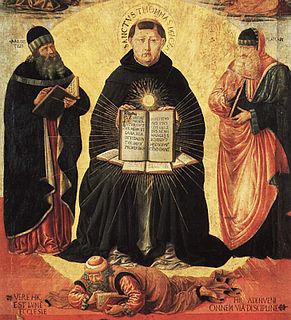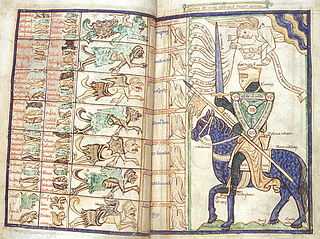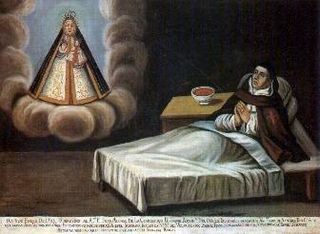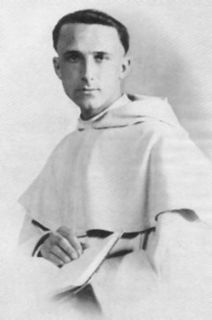Related Research Articles

Albertus Magnus, also known as Saint Albert the Great and Albert of Cologne, was a German Catholic Dominican friar and bishop. Later canonised as a Catholic saint, he was known during his lifetime as Doctor universalis and Doctor expertus and, late in his life, the sobriquet Magnus was appended to his name. Scholars such as James A. Weisheipl and Joachim R. Söder have referred to him as the greatest German philosopher and theologian of the Middle Ages. The Catholic Church distinguishes him as one of the 36 Doctors of the Church.

The Dominican Order, formally known as the Order of Preachers, is a mendicant order of the Catholic Church founded in France by the Spanish priest Saint Dominic. It was approved by Pope Honorius III via the Papal bull Religiosam vitam on 22 December 1216. Members of the order, who are referred to as Dominicans, generally carry the letters OP after their names, standing for Ordinis Praedicatorum, meaning of the Order of Preachers. Membership in the order includes friars, nuns, active sisters, and affiliated lay or secular Dominicans.

Omnipotence is the quality of having unlimited power and potential. Monotheistic religions generally attribute omnipotence only to the deity of their faith. In the monotheistic philosophies of Abrahamic religions, omnipotence is often listed as one of a deity's characteristics among many, including omniscience, omnipresence, and omnibenevolence. The presence of all these properties in a single entity has given rise to considerable theological debate, prominently including the problem of theodicy, the question of why such a deity would permit the manifestation of evil. It is accepted in philosophy and science that omnipotence can never be effectively understood.

The just price is a theory of ethics in economics that attempts to set standards of fairness in transactions. With intellectual roots in ancient Greek philosophy, it was advanced by Thomas Aquinas based on an argument against usury, which in his time referred to the making of any rate of interest on loans. It gave rise to the contractual principle of laesio enormis.

Saint Dominic, also known as Dominic of Osma and Dominic of Caleruega, often called Dominic de Guzmán and Domingo Félix de Guzmán, was a Castilian Catholic priest and founder of the Dominican Order. Dominic is the patron saint of astronomers.

The Summa contra Gentiles is one of the best-known treatises by St Thomas Aquinas, written as four books between 1259 and 1265.

Whilst in the life of the intellect 'contemplation' refers to thinking profoundly about something, in the religious life contemplation is a kind of inner vision or seeing, transcendent of the intellect, facilitated by means of practices such as prayer or meditation.

Ohio Dominican University is a private Dominican liberal arts university in Columbus, Ohio. The university has approximately 1,700 students and offers undergraduate degrees in 40 majors as well as nine graduate degree programs.

The Pontifical University of Saint Thomas Aquinas (PUST), also known as the Angelicum in honor of its patron the Doctor Angelicus Thomas Aquinas, is a pontifical university located in the historic center of Rome, Italy. The Angelicum is administered by the Dominican Order and is the order's central locus of Thomist theology and philosophy.

The Summa Theologiae, as the best-known work of Thomas Aquinas, is a compendium of all of the main theological teachings of the Catholic Church, intended to be an instructional guide for theology students, including seminarians and the literate laity. Presenting the reasoning for almost all points of Christian theology in the West, topics of the Summa follow the following cycle: God; Creation, Man; Man's purpose; Christ; the Sacraments; and back to God.

William Perault,, also spelled Perauld; Latinized Peraldus or Peraltus, was a Dominican writer and preacher.

Catholic spirituality includes the various ways in which Catholics live out their Baptismal promise through prayer and action. The primary prayer of all Catholics is the Eucharistic liturgy in which they celebrate and share their faith together, in accord with Jesus' instruction: "Do this in memory of me." The Catholic bishops at the Second Vatican Council decreed that "devotions should be so drawn up that they harmonize with the liturgical seasons, accord with the sacred liturgy, are in some fashion derived from it, and lead the people to it, since, in fact, the liturgy by its very nature far surpasses any of them." In accord with this, many additional forms of prayer have developed over the centuries as means of animating one's personal Christian life, at times in gatherings with others. Each of the religious orders and congregations of the Catholic church, as well as lay groupings, has specifics to its own spirituality – its way of approaching God in prayer to foster its way of living out the Gospel.
James Arthur was a Dominican friar and theologian. He was born in Limerick, Ireland, early in the 17th century and died most likely in 1670.
The Dominican Sisters of the Immaculate Conception are a religious community of women consecrated to Christ in the Dominican charism with the mission of living the Word of God through teaching, evangelization and health care. The community was founded in 1861 by Maria Rose Columba Bialecka (1838–1887) in Poland.
The Dominican Nuns of the Perpetual Rosary are a religious institute founded in 1880 in Calais, France, by Father Damien-Marie Saintourens, Mother Rose of Saint Mary Werhle and Mother Mary Imelda Gauthier, all of them from the Order of the Preachers.

Réginald Marie Garrigou-Lagrange was a French Catholic theologian and Dominican friar. He has been noted as a leading neo-Thomist of the 20th century, along with Jacobus Ramírez, Édouard Hugon, and Martin Grabmann. He taught at the Dominican Pontifical University of St. Thomas Aquinas, the Angelicum, in Rome from 1909 to 1960. There he wrote his magnum opus, The Three Ages of the Interior Life in 1938.
Vincent Baron was a French Dominican theologian and preacher.
Serafino Porrecta was an Italian Dominican theologian.

Thomas Aquinas was an Italian Dominican friar, philosopher, Catholic priest, and Doctor of the Church. An immensely influential philosopher, theologian, and jurist in the tradition of scholasticism, he is also known within the latter as the Doctor Angelicus and the Doctor Communis. The name Aquinas identifies his ancestral origins in the county of Aquino in present-day Lazio, Italy. He was the foremost classical proponent of natural theology and the father of Thomism; of which he argued that reason is found in God. His influence on Western thought is considerable, and much of modern philosophy developed or opposed his ideas, particularly in the areas of ethics, natural law, metaphysics, and political theory.

The Dominican Order was first established in the United States by Edward Fenwick in the early 19th century. The first Dominican institution in the United States was the Province of Saint Joseph, which was established in 1805. Additionally, there have been numerous institutes of Dominican Sisters and Nuns.
References
- ↑ Chenu, Marie-Dominique, Aquinas and His Role in Theology (Liturgical Press, 2002), p. 46.
- ↑ "St. Thomas Aquinas, OP, Summa Theologiae, IIIª, Q. 4-45". www.corpusthomisticum.org.